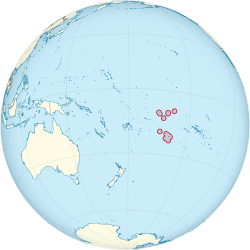
Back Pulo-pulo Cook ACE Cookeilande Afrikaans Cookinseln ALS ኩክ ደሴቶች Amharic Islas Cook AN Cociega ANG कुक द्वीपसमूह ANP جزر كوك Arabic جزر كوك ARZ Islles Cook AST
Cook Islands
| |
|---|---|
| Anthem: Te Atua Mou E (English: "God is Truth") | |
 | |
| Capital and largest city | Avarua 21°12′S 159°46′W / 21.200°S 159.767°W |
| Official languages |
|
| Spoken languages |
|
| Ethnic groups (2016 census[2]) |
|
| Demonym(s) | Cook Islander |
| Government | Unitary constitutional monarchy |
• Monarch | Charles III |
| Sir Tom Marsters | |
| Mark Brown | |
| Tou Travel Ariki | |
| Legislature | Parliament |
| Free association with New Zealand | |
| 4 August 1965 | |
• UN recognition of independence in foreign relations | 1992[3] |
| Area | |
• Total | 236.7 km2 (91.4 sq mi) (unranked) |
| Population | |
• 2021 census | 15,040[4] (223rd) |
• Density | 63.3/km2 (163.9/sq mi) (138th) |
| GDP (nominal) | 2020 estimate |
• Total | US$384 million[5] (not ranked) |
• Per capita | US$21,994 (not ranked) |
| Currency | New Zealand dollar (NZD)Cook Islands dollar (formerly) |
| Time zone | UTC–10 (CKT) |
| Driving side | left |
| Calling code | +682 |
| ISO 3166 code | CK |
| Internet TLD | .ck |
| |
The Cook Islands (Rarotongan: Kūki ‘Airani;[6] Penrhyn: Kūki Airani[7]) is an island country in Polynesia, part of Oceania in the South Pacific Ocean. It consists of 15 islands whose total land area is approximately 236.7 square kilometres (91 sq mi). The Cook Islands' Exclusive Economic Zone (EEZ) covers 1,960,027 square kilometres (756,771 sq mi) of ocean.[8] Avarua is its capital.
The Cook Islands is self-governing while in free association with New Zealand. Since the start of the 21st century, the Cook Islands has directed its own independent foreign and defence policy, and also has its own customs regulations, although it has no armed forces and therefore generally relies on New Zealand for its external defence.[9] In recent decades, the Cook Islands have adopted an increasingly assertive and distinct foreign policy, and a Cook Islander, Henry Puna, currently serves as Secretary General of the Pacific Islands Forum.[10] Most Cook Islanders are also citizens of New Zealand, but they also have the status of Cook Islands nationals, which is not given to other New Zealand citizens. The Cook Islands have been an active member of the Pacific Community since 1980.
The Cook Islands' main population centres are on the island of Rarotonga (10,863 in 2021).[4] The Rarotonga International Airport, the main international gateway to the country, is located on this island. The census of 2021 put the total population at 14,987. There is also a larger population of Cook Islanders in New Zealand and Australia: in the 2018 New Zealand census, 80,532 people said they were Cook Islanders, or of Cook Islands descent.[11] The last Australian census recorded 28,000 Cook Islanders living in Australia, many with Australian citizenship.[12] With over 168,000 visitors to the islands in 2018,[13] tourism is the country's main industry and leading element of its economy, ahead of offshore banking, pearls, and marine and fruit exports.
- ^ "Cook Islands". The World Factbook (2024 ed.). Central Intelligence Agency. 26 October 2021. (Archived 2021 edition.)
- ^ "Census of Population & Dwellings 2016 Results". Ministry of Finance & Economic Management. 2016. Table 2: Social Characteristics - Sheet 2.3. Archived from the original on 12 July 2021. Retrieved 26 December 2019.
- ^ UN the World Today (PDF) and Repertory of Practice of United Nations Organs Supplement No. 8; page 10 Archived 19 October 2013 at the Wayback Machine
- ^ a b "2021 Census of Population and Dwellings". Cook Islands Statistics Office. Section 3 of download. Retrieved 23 September 2023.
- ^ UNCTAD. "UNCTADstat - General Profile: Cook Islands". UNCTADstat. Retrieved 9 August 2021.
- ^ Cook Islands Maori dictionary by Jasper Buse & Raututi Taringa, Cook Islands Ministry of Education (1995) page 200
- ^ "Search result: "Cook Islands"". Cook Islands Languages. Retrieved 11 March 2023.
- ^ Fisheries, Ecosystems and Biodiversity. Sea Around Us
- ^ "Constitution of the Cook Islands" (PDF). Retrieved 22 July 2022.
- ^ "Cook Islands". France in New Zealand. 13 March 2014. Retrieved 30 October 2015.
Since 2001, the Cook Islands has complete sovereignty in managing their Foreign affairs according to the common declaration of 6 April 2001.
- ^ "2018 Census ethnic group summaries – Cook Islands Maori". Statistics New Zealand. Retrieved 22 January 2022.
- ^ "Ancestry 1st response (ANC1P)". Australian Bureau of Statistics. 15 October 2021. Retrieved 24 July 2022.
- ^ "Cook Islands welcome more visitors". Radio New Zealand. February 2019. Archived from the original on 8 September 2019.

